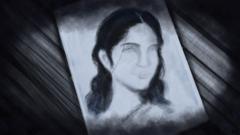Despite being a trailblazer as the first female lead in Malayalam cinema, PK Rosy's story is marred by caste discrimination and social ostracism. As the granddaughter of a Dalit family, her brief shining moment in the film Vigathakumaran led to intense backlash, forcing her into obscurity. Recent efforts by Dalit activists aim to revive her story, shining a light on the social injustices she faced.
Rediscovering PK Rosy: The Forgotten Pioneer of Indian Cinema

Rediscovering PK Rosy: The Forgotten Pioneer of Indian Cinema
Amid deep-rooted caste oppression, PK Rosy emerged as India's first female lead in Malayalam cinema, yet her legacy remains largely overshadowed.
In the early 20th century, before independence, a courageous woman dared to carve her niche in the Indian film industry at a time when female participation was heavily discouraged. PK Rosy, known as Rajamma, made history as the first female lead in Malayalam cinema through her role in the 1920s film "Vigathakumaran," or "The Lost Child," in present-day Kerala. Unfortunately, rather than being celebrated as a pioneer, her narrative was silenced, submerged under caste-based discrimination and social backlash.
Rosy came from a lower-caste community known as Pulaya, historically oppressed within India's strict caste hierarchy. As observers highlight, members of the Pulaya community endured severe mistreatment, described as “slave labour” and subjected to brutal acts for minor infractions. This societal backdrop makes Rosy's foray into acting, against all odds, even more remarkable. With support from her theater-artist uncle, she broke barriers, becoming a notable figure in local theater before being cast by director JC Daniel for a film role.
However, her appearance in an upper-caste portrayal ignited a violent backlash. During the film's premiere, Rosy and her family were barred from attending due to their caste, leading to an angry mob reacting violently against the film, which resulted in disastrous consequences for Rosy and Daniel. The situation deteriorated to such an extent that Daniel, once the pioneering figure of Malayalam cinema, never directed again, and Rosy was compelled to flee her hometown, shunning her past to forge a new life with an upper-caste husband, adopting a new identity.
The aftermath of Rosy’s career unfolded painfully, as her children distanced themselves from their Dalit heritage in favor of their father's upper-caste identity, reflecting the severe social constructs of caste. In a poignant remark, her nephew conveyed the deep-seated shame and stigma that continues to affect their family, indicating an internal conflict born from societal pressures.
Years later, Rosy's legacy remained largely forgotten until interest emerged, leading to initiatives from Dalit filmmakers and activists who aim to reclaim her narrative. Influential personalities like Tamil director Pa Ranjith are notable advocates, establishing film festivals and foundations to honor Rosy’s contributions to cinema. Yet, the gravitas of her story serves as a stark reminder that while she may have found safety, it came at the cost of her artistic identity and legacy—a reflection of society's failings rather than her own.
As scholars and advocates work to resurrect the memory of PK Rosy, her journey underlines the deep-rooted trauma linked to caste, illustrating that the fight for recognition and equality in Indian society remains ongoing.



















